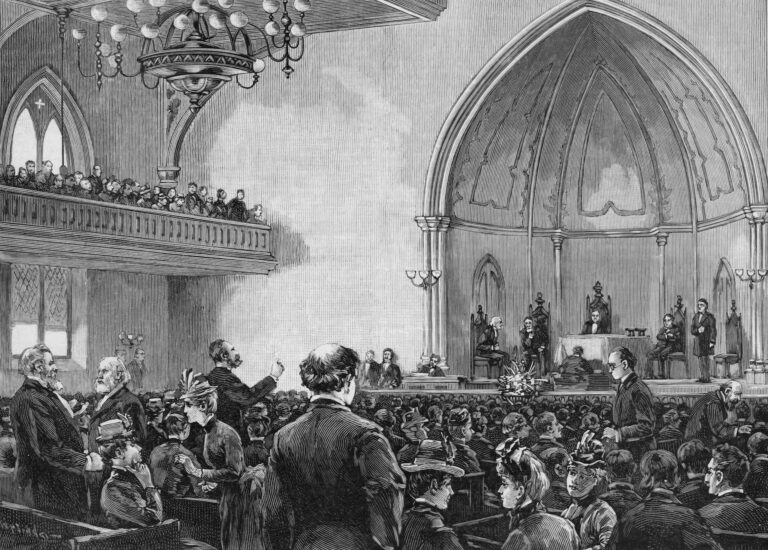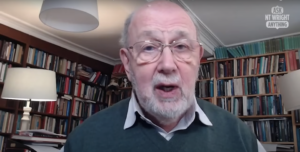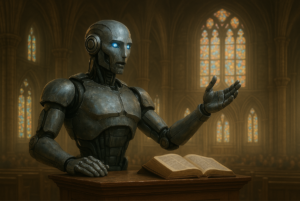On Canada Day, Pope Francis I declared that the deceased English Cardinal John Henry Newman would be canonized on October 13, 2019. Newman presents an interesting case. He converted to Catholicism from Evangelicalism, becoming a Cardinal of the Roman Catholic church. We lament his conversion and understand his story as a cautionary tale. We do not, therefore, present this article in any way to endorse his conversion but to give some insight into the life of this significant 19th-century thinker since many will have heard about his canonization.
(1) John Henry Newman was the bright oldest son of three in a middle-class family, which experienced hardship—bankruptcy, family disgrace, and feelings of marginalization followed. Yet John Henry and his brothers went to university and gained distinction. While his mother was religious (of Huguenot descent), his father was not, and he showed impatience with John when the son showed an inclination to train for the ministry of the Church of England.
(2) Newman underwent an evangelical conversion while in boarding school, and was introduced by his tutor, Mr. Mayers, to evangelical authors, such as Thomas Scott[2] (1747–1821), Joseph Milner[3] (1744–1797), and William Romaine[4] (1714–1795). Mr. Mayers, for a time, left a very deep impression on the young man. Newman entered university as an evangelical Anglican and maintained these commitments for several years, as a commitment shown by his support of causes such as the Bible Society and Church Missionary Society.
(3) Under the influence of tutors at Oriel College, Newman entered a period during which he “flirted” with theological liberalism, which was of an early type associated with Samuel Taylor Coleridge (1772–1834), before reacting strongly against it. In this period of reaction, Newman allied himself with those who would be his allies in launching the “Tracts for the Times” pamphlets in 1833.
(4) Having begun by advocating that the Church of England (and Protestant Church in Ireland) resist current Parliamentary efforts to reduce its privileged role in British society (and in tandem to advance the liberties of Protestant Nonconformists and Roman Catholics), Newman eventually moved towards a position in which he exalted forms of Roman Catholic devotion and doctrine. When rebuked for these tendencies, he at first withdrew from public ministry, living in a monastic-style community outside Oxford, and then in 1845, he was quietly received into the Roman Catholic Church. This eventually entailed his receiving Roman Catholic ordination in 1847, as his Anglican ordination was not considered valid.
(5) Newman the Roman Catholic convert was like a ship becalmed; he found himself looked on with suspicion and mistrust by his new confreres. Was he a secret agent? Had he some Protestantising agenda? Newman hoped for some major role in his new communion, yet was not trusted enough to be given one. After some years supervising a monastic residence—an Oratory near Birmingham, he was sent to Dublin to become the rector of the fledgling Catholic University of Ireland. There too, he encountered suspicion from long-established Catholics. Who was he, a former Protestant and a former Oxford tutor, to be advising them? Later, he edited a Catholic literary periodical, The Tablet, but was relieved of his duties. He then proposed launching an Oxford Catholic college, and was again rebuffed. He seemed like a fish out of water.
(6) Protestant criticism dogged Newman a decade or more after his “conversion” to Roman Catholicism. The chief criticism—that he had been a Roman Catholic “agent” for a long period prior to his departure for that communion—was given its most forceful expression by Charles Kingsley (1819–1875), a Cambridge historian. Newman wrote his famous Apologia Pro Vita Sua (1864), as a stylised account which advanced the idea of a relentless progression from his early evangelical phase to his later Catholicism. Newman later substantially revised this account in an Autobiographical Memoir, which only published in 1956.
(7) Had Newman not carved out for himself a role as a literary apologist for Catholicism in England, it is hard to see that he could have found fulfillment in his new communion. He championed a reasonable Anglicised Catholicism that stopped well short of the championing of foreign papal authority which characterised much European Catholicism in that period. Some of Newman’s fellow Anglican converts to Roman Catholicism were of this ultramontanist outlook. He, however, was decidedly not.
(8 It was therefore a surprise when, in 1879, Newman was named a cardinal of the Roman Catholic Church. It was unusual both because he had been a convert to Catholicism and he had never first been a bishop—the usual pattern for those named cardinal. In 1878, the newly elected Pope Leo XIII (1810–1903) evidently saw a usefulness in Newman that his predecessor Piux IX (1792–1878) disagreed.
(9) Nevertheless, as cardinal, Newman took with him to Rome the reputation for independence of mind for which he had earlier been known. When at the First Vatican Council of 1870, it was proposed that the assembled dignitaries endorse the proposal of the Pope’s infallibility, Newman, being still in England, took the position that this stance was “inopportune.” It was his wish that pronouncements issued on this basis would be very rare.
(10) Newman remains an enigma. Particularly since the 1960s, Newman’s reputation within Catholicism has risen—in part because he was seen to represent an interesting “model” of a serious Christian thinker who “crossed” the Tiber. On the basis of his labours he has first been “beatified” in 1991 and now on the claimed basis of two miracles wrought in his name, will be “canonized” on October 13, 2019. Yet it is doubtful that Newman would have approved of such a gesture. In 2010, efforts undertaken to exhume his remains so that they might be reburied in grander style, found no remains whatsoever.
[2]https://banneroftruth.org/us/about/banner-authors/thomas-scott/
[3]https://en.wikisource.org/wiki/Milner,_Joseph_(DNB00)
[4]https://www.evangelical-times.org/20742/william-romaine-1714-1795/



















